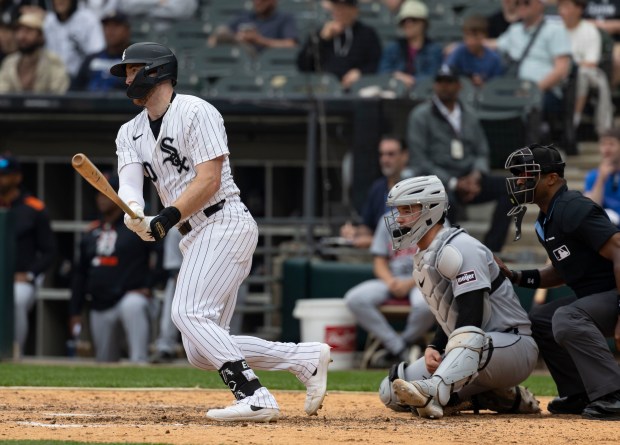Garrett Crochet was sentenced to two months of hard labor Tuesday with no time off for good behavior.
The valuable lesson the Chicago White Sox ace learned from presuming management would take kindly to his demand for an extension from any team interested in acquiring him was indeed a harsh one.
Instead of going to a contender and possibly winning a ring, Crochet will now play out the string for a team on pace to finish with the worst record in baseball history.
Enjoy the view, and better luck in the offseason, if general manager Chris Getz opts to try again.
The “hurtful” act of having his representatives leak the information to the media less than a week before the trade deadline apparently proved to be too much for Sox management, which abhors any leaking. Or at least the leaks that don’t come out of the Sox front office that made Crochet endure a couple of months of answering questions about being trade bait.
So Crochet presumably will take the mound for the Sox next weekend in Minnesota, where the only thing at stake for the team is avoiding a spot in the history books under the section “Worst record (all-time).”
Getz, who said he was “taken aback” by the “tactics” used by Crochet’s camp and called it “hurtful,” managed to keep both of his most valuable assets — Crochet and Luis Robert Jr. — while dealing Eloy Jiménez, Tanner Banks and Paul DeJong for a slew of prospects Tuesday.
In his first trade deadline as GM, Getz deserves a “C” for “chutzpah.” He can blame Crochet for hurting his own trade value, denying the team a chance to restock the farm system and ensuring the rebuild takes longer than anyone imagined even a week ago.
Did the “demand” impact interest?
“It’s tough to tell,” Getz said. “There were certainly a lot of questions about the message that was put out there. How it truly affected his trade market, it’s tough to measure … We’re still very excited to have Garrett Crochet. We’re not disappointed at all. And we’ll revisit conversations about him being with the White Sox, but if we need to have conversations about improving the long-term health of the organization, we’ll explore that as well.”
Manager Pedro Grifol, who reiterated Tuesday he is not worried about being let go after the season, believes the Sox are “in a better spot than what people think we are. It’s just hard to see.”
Rose-colored glasses are one thing. Grifol’s prescription must be out of this world if he thinks a 27-81 team with a 15-game losing streak entering Tuesday is in a “better spot” than anyone thinks.
He spoke about the minor-league system, and the pitching and defense, adding: “When you’ve got the pitching we’ve got, you’re always able to turn things around quickly … I don’t like our record. It has nothing to do with our record. But I like the way this thing is moving and the direction it’s moving.”
You have to give Grifol credit for trying to spin a positive out of the biggest negative in recent memory. He might as well have added that there have been no shootings inside the ballpark all season, so things are looking up.
As for Crochet’s future, Grifol couldn’t say anything definitively as he spoke before the trade deadline. But he envisioned the pitcher starting for the Sox’s next opening day, which is still scheduled to take place in March.
How they’ll deal with Crochet’s workload for the rest of the season remains to be seen.
“We think about that all the time,” Grifol said. “Obviously if he is here we’ll have to continue our talks with all the departments we talk about that are involved and see where we want to go. I’m assuming we’ll stay at five (innings) and 75 (pitches) for at least one more (start), and then start dwindling this thing down a little bit.
“It’s definitely a hot topic within our organization, and within that clubhouse and my office as well, and it’s really, really important because if he’s here he’s a huge piece to this thing moving forward. You’re talking about a guy that pitched opening day this year and will probably pitch opening day next year, and it’s important for us to put him in a position to take that ball without restrictions and try to move this thing in the right direction.”
If Crochet won’t pitch out of the bullpen, as he has said, is the only option to shut him down when he reaches an innings limit determined by the department heads, Getz and Grifol?
“No, no no,” Grifol replied. “An inning is an inning. It doesn’t matter if it’s out of the bullpen or to start a game. But we’ll do this thing right. It all starts and ends with him, and it’s important for guys like him to be part of the program, and it’s important for guys like him to have conviction in the program.
“If you don’t have conviction you’re probably trending in a way that it can create room for injury. If you have buy-in and have conviction in the program, I think everything works out smooth.”
Crochet was seemingly at ease in the clubhouse before the game, checking his phone like almost everyone else except DeJong, who was packing his gear into a bag and exchanging hugs with teammates before heading across the field to the Kansas City Royals clubhouse.
Jiménez and Banks were dealt while Grifol was at the batting cage with Tony La Russa, watching batting practice in the near-empty ballpark.
The season goes on, and with the trade deadline over, the only thing left to focus on is the product on the field.
Maybe the Sox can now get to work on extending Crochet and giving him the kind of money that aces command these days.
Or maybe my rose-colored glasses need a new prescription.




